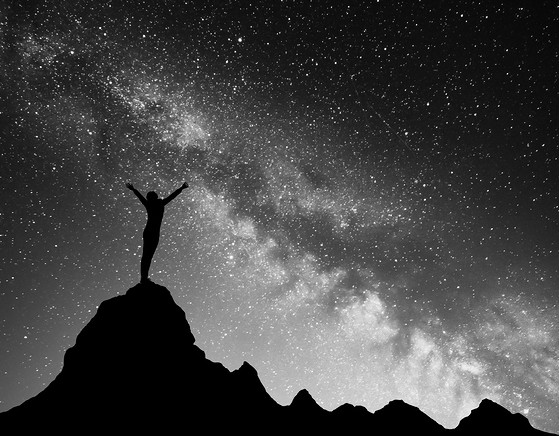We Do Not Begin at the Beginning, But Rather Where We Are.

{source}
In saying Perhaps, we indicate a lapse in the certainties of logic.
We do not begin at the beginning, but rather where we are. We call it this to orient ourselves, and to distinguish then from now and when from then. We do so occasionally, however, to beguile ourselves. Even so, without beginnings life would blend blandly, denying us the opportunity to make (and mark) change, however subtle and insignificant.
Though subtle, change is seminal still despite what its subtlety conceals. In this regard, beginnings contain all we intend when we own them fully, however feebly we begin.
Hence the need to begin, though circumstances bellow to bully us to compromise. In refraining, we consign ourselves to circumstances whose origins insult our autonomy and betray our intentions. Amid these, however, we see how beginnings are needed lest we be cheated of our right to self-rule, which is the first rule of reason.
We rule ourselves daily, though we perceive it poorly based on our choices and complaints. We don’t, however, get to choose our families unless we are born again, because they begin before we embark. The only way to be born again is to start anew and pursue what impels amid what appalls.
Our families meanwhile will continue when we depart, however devoted each is to the other. In this regard, mother manifests the ultimate beginning. From her we receive our existential deed of trust. Initially, though, she seems to be one with us, the whole of our soul and of our self. Things change, however, when we pronounce Now, especially when I attends. Now and I author beginnings.
Rightly conceived, these beginnings inspire us to reject compromise in our efforts to self-actualize. When we pronounce these, others perceive us differently than they did before.
Sometimes this difference favors; routinely, however, it inflames. Then others become incensed, as if we are inextricably linked. Yet beginnings can’t be stopped once they begin, though our choices chasten and offend. Without beginnings, we experience voids and vapors whose odors enfeeble.
Even so, we must begin if we are to overcome the blindness that confines us to circumstances and their circuits though others are offended. Better to offend than rescind our right to choose.
Beginnings offend when we embrace self-rule, rejecting the arrangements we entered when we were centered in ignorance and the predicament caused thereby.
Our beginnings are especially painful when others paint them as endings (and insurrections) instead. The difference between each often hinges on our perch, where we sit and how we see. Yet all things are in flux despite the breaks beginnings suggest and endings deny.
Convincing others alternately is often exhausting because our beginnings change their emotional maps, ours also. Hence the separation that follows and the division that fosters a sense of alienation. It’s as if we cross an invisible boundary that is the founding of all change, lasting change especially.
Beginnings are easier to embrace, however, when we remember they started long before we disappointed others’ expectations.
Yet, Now for us is Then for them and Why for some, as they note (and denounce) our decision. Still, we must begin despite their resistance, though we are tortured (and tempered) simultaneously. We don’t see this when time winds indifferently. Even then, however, the streams of consciousness carry us along. We don’t have to perceive it to experience its power and support.
Unfortunately, however, many people choose to stay stuck instead.
They reject what beginnings bring because they fear fortune’s slings in the form of family, friends and rejection. In fearing these, they not only avoid beginnings, they inflate them, mimicking myths and legends which inspire the spin, “In the beginning.” Consider Genesis and its comprehensive phrase, which includes all time frames. From which also hatches the seminal sciences — cosmogony and cosmology.
Combined with “once upon a time,” it is difficult to design human history otherwise because of the frame this phrase provides. The same holds for “long ago” and “far away.” The latter illumines our relationship to space and time’s splice of tracts that back our notion of beginnings.
All narratives employ these negatives creatively. Otherwise it would be impossible to perceive one phase from another and adjust ourselves accordingly. In reality, however, beginnings never end and endings are merely landings wherein consciousness quickens us.
What matters is whether we acknowledge our unity, however much time uses its seams to separate us. We must be especially conscious when seams separate us from ourselves. Then, preeminently, we must embrace our unity until we recover ourselves. In doing so, we preserve our sanity, which time routinely indicts when circumstances cloud and consciousness blends.
It’s, moreover, the method of reason to obstruct when it encounters the flux of infinity. By obstructing, however, it threatens our sanity. Hence the need to denote its flow lest we go where we regret.
***
A former corporate trainer and university lecturer, Dr. Joel Bryant is an avid reader, writer, speaker, thinker and dreamer. He is also the author of over 40 books on various topics, each exploring themes of change, growth and greatness. He holds a doctorate in Educational Leadership from UNC Charlotte, where he spent five years lecturing in the Philosophy Department. He resides in Charlotte, NC.
***
{Join us on Facebook, Twitter, Instagram & Pinterest}

